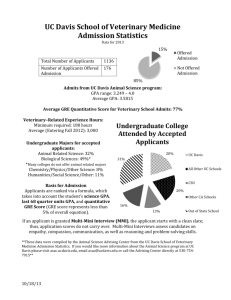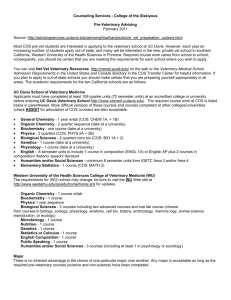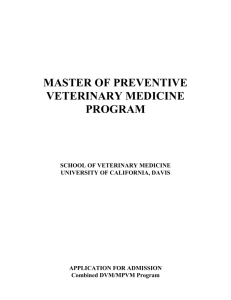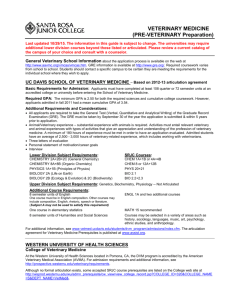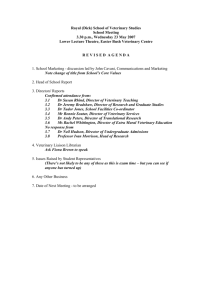Veterinary Medical School Preparation at UC Davis
advertisement
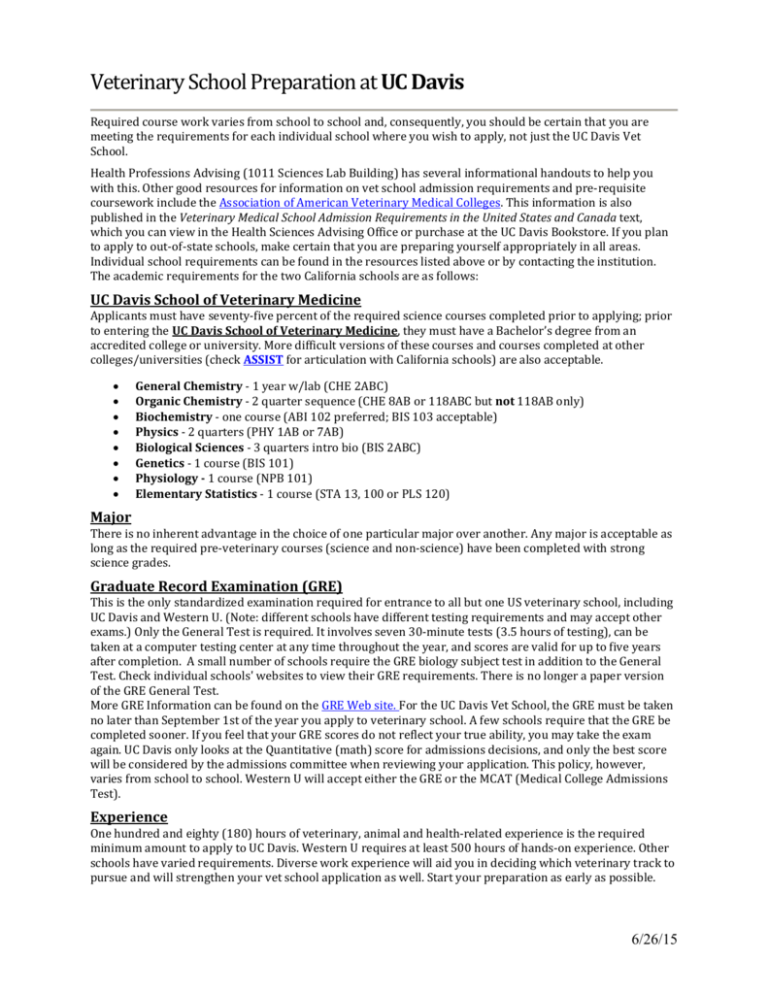
Veterinary School Preparation at UC Davis Required course work varies from school to school and, consequently, you should be certain that you are meeting the requirements for each individual school where you wish to apply, not just the UC Davis Vet School. Health Professions Advising (1011 Sciences Lab Building) has several informational handouts to help you with this. Other good resources for information on vet school admission requirements and pre-requisite coursework include the Association of American Veterinary Medical Colleges. This information is also published in the Veterinary Medical School Admission Requirements in the United States and Canada text, which you can view in the Health Sciences Advising Office or purchase at the UC Davis Bookstore. If you plan to apply to out-of-state schools, make certain that you are preparing yourself appropriately in all areas. Individual school requirements can be found in the resources listed above or by contacting the institution. The academic requirements for the two California schools are as follows: UC Davis School of Veterinary Medicine Applicants must have seventy-five percent of the required science courses completed prior to applying; prior to entering the UC Davis School of Veterinary Medicine, they must have a Bachelor’s degree from an accredited college or university. More difficult versions of these courses and courses completed at other colleges/universities (check ASSIST for articulation with California schools) are also acceptable. • • • • • • • • Major General Chemistry - 1 year w/lab (CHE 2ABC) Organic Chemistry - 2 quarter sequence (CHE 8AB or 118ABC but not 118AB only) Biochemistry - one course (ABI 102 preferred; BIS 103 acceptable) Physics - 2 quarters (PHY 1AB or 7AB) Biological Sciences - 3 quarters intro bio (BIS 2ABC) Genetics - 1 course (BIS 101) Physiology - 1 course (NPB 101) Elementary Statistics - 1 course (STA 13, 100 or PLS 120) There is no inherent advantage in the choice of one particular major over another. Any major is acceptable as long as the required pre-veterinary courses (science and non-science) have been completed with strong science grades. Graduate Record Examination (GRE) This is the only standardized examination required for entrance to all but one US veterinary school, including UC Davis and Western U. (Note: different schools have different testing requirements and may accept other exams.) Only the General Test is required. It involves seven 30-minute tests (3.5 hours of testing), can be taken at a computer testing center at any time throughout the year, and scores are valid for up to five years after completion. A small number of schools require the GRE biology subject test in addition to the General Test. Check individual schools' websites to view their GRE requirements. There is no longer a paper version of the GRE General Test. More GRE Information can be found on the GRE Web site. For the UC Davis Vet School, the GRE must be taken no later than September 1st of the year you apply to veterinary school. A few schools require that the GRE be completed sooner. If you feel that your GRE scores do not reflect your true ability, you may take the exam again. UC Davis only looks at the Quantitative (math) score for admissions decisions, and only the best score will be considered by the admissions committee when reviewing your application. This policy, however, varies from school to school. Western U will accept either the GRE or the MCAT (Medical College Admissions Test). Experience One hundred and eighty (180) hours of veterinary, animal and health-related experience is the required minimum amount to apply to UC Davis. Western U requires at least 500 hours of hands-on experience. Other schools have varied requirements. Diverse work experience will aid you in deciding which veterinary track to pursue and will strengthen your vet school application as well. Start your preparation as early as possible. 6/26/15 Application Format UC Davis and Western U use the Veterinary Medical Colleges Application Service (VMCAS). This is the centralized application process for applications for most of the U.S. veterinary medical colleges. VMCAS organizes the distribution, collection and processing for applications but is not involved with setting application, admissions, or deadline requirement, or with making admission decisions; questions concerning these matters should be directed separately to each school of veterinary medicine. Applicants to WU may apply through VMCAS or directly to the university. You are encouraged to speak with a Health Professional Advising (HPA) pre-vet advisor if you have questions. You must also request that the Educational Testing Service (ETS) mail copies of your GRE scores to VMCAS. This can be done when registering to take the examination. Transcripts can be ordered in the lower level of Mrak Hall or online. Application Process A student applying to veterinary school has the option of doing so after two years of college have been completed and the minimum requirements (see above) have been met, but most successful applicants complete a bachelor's degree prior to matriculation into vet school. Note that UC Davis now requires a bachelor’s degree prior to matriculation, but this can vary from school to school. The Veterinary Medical Colleges Application Service (VMCAS) is now available only online. Applications need to be submitted one year prior to the year of matriculation with a September 15 deadline for most schools. Applications usually become available on the Web site in May. Contact any non-VMCAS schools you would like to apply to directly to request an application. Although UC Davis requires only the VMCAS application, Western U and many other schools require a supplemental application. Supplemental applications generally consist of several short essays, and are available on the individual schools' websites. Supplemental applications usually have the same deadline as the VMCAS application. Be sure to be on the lookout for any Health Professional Advising (HPA) workshops regarding applications and interview preparation. At each stage of the application process, HPA advisors are available to assist you through the use of the Web, printed materials, workshops and individual advising. They will review your personal statement and answer questions about your application and resume. Visit HPA advising at http://hpa.ucdavis.edu/healthcareers/veterinary.html, or via their Facebook page. Appointments can also be made to meet one-on-one with an adviser in 1011 Sciences Lab Building; see their website for more details regarding making an appointment. CRITERIA FOR SELECTION Selection for an interview: • Last 68 quarter units GPA • Science GPA • PPI (Personal Potential Index) score, done by your evaluators • Quantitative (math) GRE Score (weighted approximately 5% of selection) After applicants are selected for an interview, only the interview score is considered to determine admission. 2015 Admissions Data for UC Davis School of Veterinary Medicine Total Number of Applicants Number of Applicants Offered Admission 730 161 Averages for California Admits: • • • • • • Admits from UC Davis Animal Science program: GPA range: 3.453 – 4.0 Average GPA: 3.697 GRE Quantitative Score: 75% Science GPA: 3.65 Last 68 Quarter Units GPA: 3.78 PPI score: 4.2 Veterinary – Related Experience Hours: Minimum required: 180 hours 6/26/15
